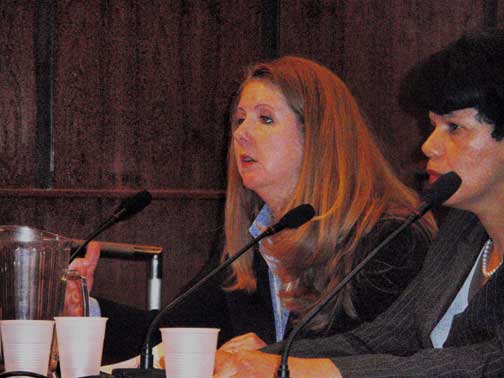


SERVICES
Tuesday December 7, 2010
Michelle Cleary: Focused On The Addictive Prevention And Treatment Needs Of Service Members Returning From War Zones
Ms. Cleary testifying at the NYS Assembly hearding on Women Veterans Issues on February 2010 People of Irish decent are found in great numbers in each and every profession throughout the Empire State, and one who truly stands out in her field: Michele N. Cleary, of Upstate New York. Ms. Cleary has been administering addictive prevention and treatment assistance programs focused on the needs of America's service men and women returning from Iraq and Afghanistan. Since 2005 Ms. Cleary has been a leader in her field as Executive Director of the Institute for Professional Development in the Addictions (IPDA), and prior to that helped implement various insurance projects including the Voucher Insurance Program and the Healthy NY program for the state Insurance Department. "We're all exposed to addiction at some level, and having the opportunity of being involved in this field is obviously something I've been honored to do," Michelle commented during an interview for this story, whose family hails from County Laios. "No country in the world has done more for world hunger then that of Ireland," she added, "It's the spirit of being Irish that you give back. Commenting specifically on the work she does in the addictions, Michelle spoke of "the disconnect between our general population and our military service members" when it comes to treatment knowledge and opportunities. Part of the problem is the multitude of "silos" in the military treatment system - and it's been very gratifying to her to have been able to work with the Veteran's Administration system in support of service member's treatment needs. Under Ms. Cleary's leadership, IPDA has a long list of accomplishments to its credit, including designing and implementing the Addictions Career Resource Center, a Internet location to attract individuals to the field of addictions and disseminate information and resources to the field. She also secured the necessary funding and organized three highly regarded conferences for mental health and substance abuse professionals and members of the veteran's community that attracted more than 350 participants on the subject of emerging issues facing returning service members. Michelle coordinated "an outstanding group of professionals for the Veteran's Roundtable in Fort Drum" (headquarters for the Army's storied 10th Mountain Division), according to Judy Gilbert, Director of Residential Services for the Veteran's Outreach Center in Rochester, New York. Another colleague in the field, Michael Peluso, New York State Education Department Vocational and Educational Services for Individuals with Disabilities Coordinator, said "it was empowering to be working with an army of human service professionals intent on sharing their skills and support for veterans and their families." Unfortunately for Michelle and the many veterans and groups supported by her outreach work throughout New York, the non-profit Institute was forced to close its doors in June, the result of losing their state contract last year and the loss of other government funding. The Institute's closure was unfortunate she said, because "word was getting around the state that there was an organization that really understood the issues and what was required" to coordinate more comprehensive knowledge among the treatment community. But "it's easy to cut something that doesn't affect direct care" she observed. As another of her colleagues put it, the programs provided by the Institute were a wonderful opportunity "for the betterment of veterans; it is a concrete example of integrated treatment planning in action." "Not all vets will self-identify," Ms. Cleary said, adding that "there is a lot of help for returning vets with wounds, but not with addictions." She said the work of the Institute was instrumental in addressing the problem, and she hopes to continue her service in some other venue. "I want to do more Veteran's work," she commented while looking toward the future, adding "we need to help open the dialogue further, and I would like to be part of that process. The need does not go away with the closing" of IPDA, she concluded. Her best advice for the future of the addiction treatment sector: "A lot of work has been done - utilize the leaders and help shape the treatment steps so we're not reinventing the wheel. We need professional development above all, and must consider the importance of a work force that has all the training and information that's available." "More of our veterans and their families will struggle with addiction and there will be a higher rate of re-lapses if we do not provide the quality care they deserve." Irish Professional Profiles: An occasional series in the Irish Examiner describing the professional lives of interesting people |
CURRENT ISSUE

RECENT ISSUES


SYNDICATE
[What is this?]
POWERED BY

HOSTED BY

Terms of Service | Privacy Policy
Website Design By C3I






